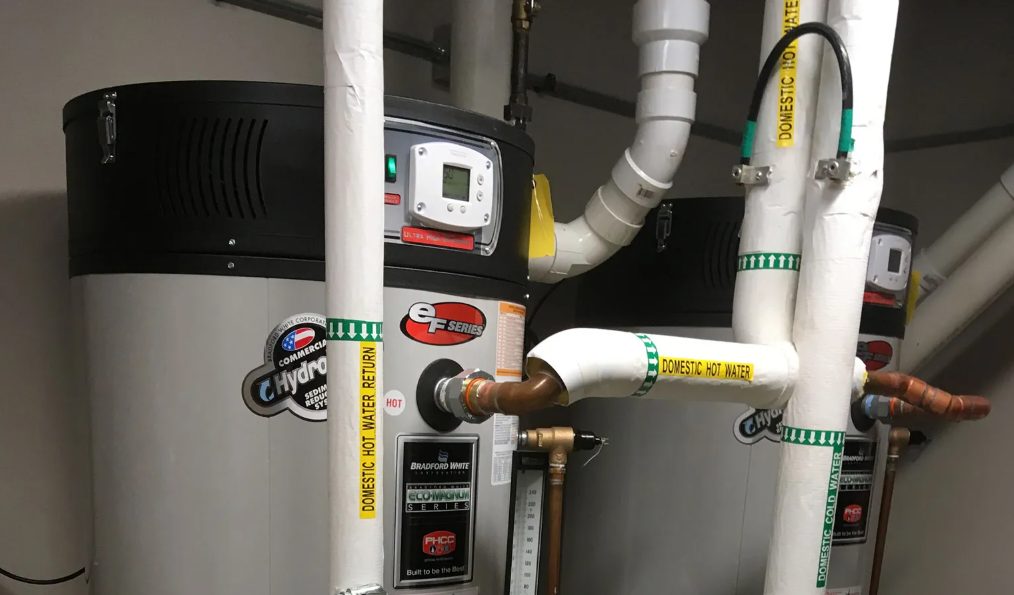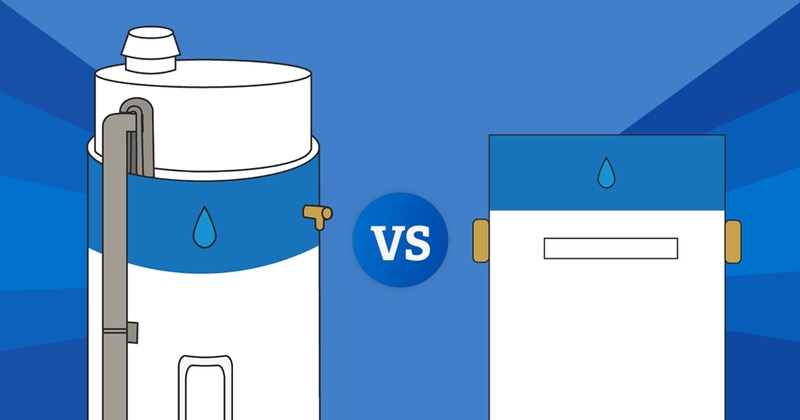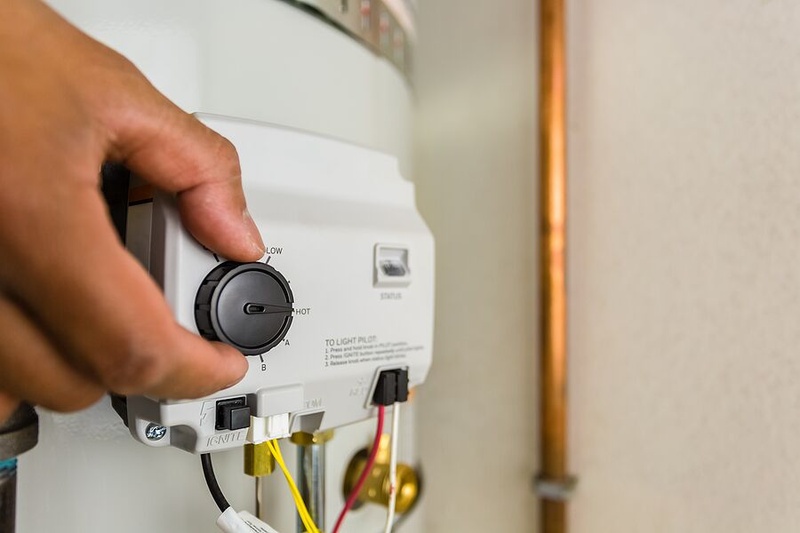
Amperage is a very important specification of water heater that defines the amount of electrical current that your water heating system will consume when it is in use. The amp requirements of water heaters are important in safe installation, circuit sizing and avoiding electrical hazards.
When you are replacing a worn out unit, troubleshooting electrical problems, or installing a new one, it is important to know about water heater amps so that you can be sure that the electrical system of your home can support the load without the risk of an electrical fire.
| Water Heater Type | Typical Amperage Range | Voltage | Circuit Breaker Size |
|---|---|---|---|
| Conventional Electric (40-50 gal) | 18-25 amps | 240V | 30 amps |
| Tankless Electric (Whole House) | 75-150 amps | 240V | Multiple 40-60 amp circuits |
| Heat Pump Water Heater | 15-20 amps | 240V | 30 amps |
| Gas Water Heater (Electric Components) | < 5 amps | 120V | 15 amps |

Understanding Electrical Terms for Water Heaters
It is necessary to know the basic electrical terminology before getting to the details of amp requirements of water heaters. The electrical current is measured in amperage (amps). Voltage (volts) is the electrical pressure which drives the current along the wires. Wattage (watts) shows the power consumption and is computed by multiplying amps and volts.
In the case of water heaters, these measurements are related. An average 4500-watt water heater on 240 volts will consume approximately 18.75 amps. The formula that describes this relationship is Amps = Watts / Volts. This knowledge is useful when sizing circuits and whether your electrical panel can handle your water heater.
The Importance of Correct Amperage
It is important to use the right amperage of your water heater because of a number of reasons. To begin with, low amperage may cause circuit overloads, tripped breakers and even fire hazards. Second, the amperage should be correct to achieve maximum performance and heating. Lastly, the electrical codes demand particular amperage ratings of water heater installations to ensure safety.
Amp Requirements for Different Types of Water Heaters

The electrical requirements of different types of water heaters are different. Learning these differences will assist you to select the appropriate model that suits the electrical capacity of your home and be ready to install it.
Electric Tank Water Heaters
The most popular type of electric tank water heaters is found in most American households. These units are normally 240 volt and consume 18-25 amps depending on the wattage rating. The heating elements of most residential models are between 3800 and 5500 watts. A typical 50-gallon electric water heater having 4500-watt elements needs a special 30-amp circuit.
Models with higher capacity or higher wattage elements can use more current. High-recovery units may have 6000-watt elements which may need 25 amps at 240 volts, and need a 30-amp or even 40-amp circuit depending on local codes.
Tankless Electric Water Heaters
The electric tankless water heater requires a lot of amperage compared to the tank type. These on-demand systems heat water immediately as it passes through the unit and this necessitates a lot of electrical power. Whole-house tankless electric units are usually 18,000 to 36,000 watts, and use 75 to 150 amps.
Because of these large loads, tankless electric water heaters frequently need several dedicated circuits and in some cases even an electrical service upgrade. An average whole-house tankless system may require three 40-amp 240-volt circuits, which may be a large electrical installation project.
Don’t Overpay for HVAC Services – Call 888-894-0154 Now to Compare Local Quotes!
Heat Pump Water Heaters
Heat pump water heaters are energy efficient since they do not produce heat, but move it. These hybrid units normally consume 15-20 amps on 240-volt circuit. They have lower operating amperage than conventional electric models, but still need a dedicated 30-amp circuit to support startup loads and backup elements.
The benefit of the heat pump water heaters is that they consume less energy in normal use, but they still have conventional heating elements in case of peak demand, which may temporarily draw more amperes.
Gas Water Heaters with Electric Components
Gas water heaters are heated by natural gas or propane, although they may contain electronic ignition, controls and fans. These electrical parts normally consume less than 5 amps and run on regular 120-volt circuits. A standard gas water heater can be wired to a 15-amp circuit which is far less demanding than electric types.
Even the high efficiency gas models that have powered venting systems and electronic controls usually have little electrical service needs, and thus are a choice in homes with low electrical capacity.
How to Calculate Water Heater Amperage
Determining the amperage needed in a water heater is a necessary process in the correct installation. The simple equation is:
Amps = Watts ÷ Volts
To take an example, a 4500 watts water heater operating on 240 volts needs: 4500 / 240 = 18.75 amps. Nevertheless, circuit breakers are supposed to be rated at 125 percent of continuous load, so this water heater would require a 30-amp circuit (18.75 x 1.25 = 23.4, rounded up to the nearest standard circuit breaker size).
Examples of Common Water Heater Calculations
- 40-gallon water heater (4500W): 4500W ÷ 240V = 18.75A → 30A circuit required
- 50-gallon water heater (5500W): 5500W ÷ 240V = 22.9A → 30A circuit required
- Small tankless (24kW): 24000W ÷ 240V = 100A → Multiple circuits required
- Gas water heater (electronic ignition): 500W ÷ 120V = 4.17A → 15A circuit is sufficient
Note that most water heaters have two heating elements, and most of them do not run both elements at the same time, so the calculations must be done using the highest wattage element.
Circuit and Wiring Requirements
Safe operation of water heaters is important by proper wiring. The National Electrical Code (NEC) has given certain requirements to the installations of water heaters which should be adhered to.
Circuit Breaker Sizing
Circuit breakers guard your electric system against overload and have to be properly rated to the amperage load of the water heater. As stated, the breakers are to be sized at least 125 percent of the continuous load. Common breaker sizes to be used on water heaters are:
- 30-amp breakers: Typical for most residential electric tank water heaters
- 40-amp breakers: Applied in bigger tank water heaters with more wattage elements
- Multiple 40-60 amp breakers: Required for tankless electric water heaters
- 15-amp breakers: Sufficient for gas water heaters with electronic components
Wire Gauge Requirements
The size of the wire should be equal to the circuit breaker to avoid overheating. Water heaters Common wire gauge requirements:
| Circuit Breaker Size | Required Wire Gauge (Copper) | Required Wire Gauge (Aluminum) |
|---|---|---|
| 15 amps | 14 AWG | 12 AWG |
| 20 amps | 12 AWG | 10 AWG |
| 30 amps | 10 AWG | 8 AWG |
| 40 amps | 8 AWG | 6 AWG |
| 50 amps | 6 AWG | 4 AWG |
Undersized wiring is a significant fire hazard, whereas oversized wiring is an unnecessary cost to the installation. Local code requirements should always be checked, because they are sometimes more stringent than the national standards in certain jurisdictions.
Dedicated Circuit Requirements
Electric water heaters need a dedicated circuit, which implies that the circuit is used by the water heater alone. This will avoid overloading and the water heater will get sufficient power. Using the same circuit as other appliances or outlets may cause breakers to trip and even safety risks.
Signs of Amperage Problems in Water Heaters

Water heaters have electrical problems that tend to be exhibited in different forms. The ability to identify these signs can be used to solve the problems before they become severe or dangerous.
Circuit Breaker Tripping
A sure sign of amperage problems is frequently tripped circuit breakers. This may indicate that the water heater is pulling too much current on the circuit than it is rated to handle, perhaps because the heating element is failing, or the wiring is faulty, or the circuit is undersized. In case your water heater keeps tripping its breaker, then have it checked by a professional electrician.
Insufficient Hot Water
In cases where a water heater is not able to pull enough amperage, then it might not be able to heat water. This may be in form of tepid water or hot water that runs out fast. Although the list of possible reasons of lack of hot water is long, electrical problems, such as wrong voltage or current flow, are the most frequent causes of the problem in electric models.
Slow Recovery Time
When your water heater is taking longer than usual to heat up water after it has been depleted, then there could be an electrical issue. Inadequate amperage may cause heating elements to be used below their rated value, which increases recovery time by a large margin. This is especially evident following a high-demand time such as several showers.
Unusual Noises or Odors
There are cases when electrical issues may lead to strange buzzing or burning smells. These are grave red flags that indicate that there should be intervention. Smells that are burning in specific could be signs of overheated wires or connections, which are serious fire risks.
Upgrading Your Electrical System for a New Water Heater

When you are changing an old water heater to a new one or more so changing the type, you might require an upgrade of your electrical system to suit the new amperage.
When Is an Electrical Service Upgrade Necessary?
An electrical service upgrade might be necessary in several situations:
Don’t Overpay for HVAC Services – Call 888-894-0154 Now to Compare Local Quotes!
- When switching from a gas to an electric water heater
- When a tankless electric water heater (which needs much more amperage) is installed
- When your electrical panel is already at or near capacity
- When your house has old wiring that does not comply with the present code requirements
- In replacing a smaller capacity water heater with a larger capacity water heater of greater wattage elements
A licensed electrician will be able to do a load calculation to see whether your current service is sufficient to carry the extra load of a new water heater.
Working with Electricians
Water heater electrical work requires hiring of a qualified electrician. They can:
- Assess your current electrical service capacity
- Recommend appropriate upgrades if necessary
- Install proper wiring and circuit protection
- Ensure compliance with local building codes
- Provide documentation needed for permits and inspections
Water heaters electrical work is not a DIY project unless you are professionally trained. Water, electricity, and high amperage pose great safety hazards.
Permits and Inspections
The installation of water heaters in most localities needs a permit particularly where there is electrical work. The permit procedure normally entails:
- Submitting an application describing the planned work
- Paying a fee based on the scope of the project
- Having the completed work inspected by a building official
- Receiving final approval before putting the system into regular use
It may be tempting to skip permits to save time or money but this may cause issues when you sell your home and it may also invalidate insurance coverage should problems arise.
Energy Efficiency and Amperage Considerations
Amperage and energy efficiency are also a consideration in choosing a water heater. Knowing this relationship can assist you to make better choices regarding the energy consumption of your home.
Lower Amperage Doesn’t Always Mean Higher Efficiency
The myth is that the lower the amperage the more energy efficient it is. Although the heat pump water heaters consume less current in normal operation compared to the conventional electric models, the correlation between the amps and efficiency is not straightforward. A more pertinent rating is the Energy Factor (EF) or Uniform Energy Factor (UEF) that shows how well the water heater uses energy to produce hot water.
Such as a heat pump water heater may be 15 amps with a UEF of 3.5, whereas a conventional electric model is 20 amps with a UEF of just 0.93. The heat pump model is much more efficient in this case even though the difference in amperage is not that big.
Impact on Utility Bills
The amperage of your water heater influences your utility bills by its connection with wattage. As water heaters usually consume 14-18 percent of the energy consumed in a home, the choice of an energy-efficient model can save a lot. The following is how various water heaters could affect your bills:
| Water Heater Type | Typical Amperage | Annual Energy Cost (Estimated) |
|---|---|---|
| Standard Electric Tank | 18-25 amps | $580-$650 |
| Heat Pump Electric | 15-20 amps | $240-$300 |
| Tankless Electric | 75-150 amps | $520-$590 |
| Gas (with electronic ignition) | < 5 amps | $300-$450 |
These numbers are dependent on local utility rates, usage patterns and the efficiency of each individual unit.
DIY vs. Professional Installation Considerations
Although some homeowners may think of installing the water heater by themselves to save money, the electrical part of the installation process may need the skills of a professional.
Safety Considerations
The installation of water heaters is associated with some safety hazards, particularly when it comes to electricity:
- Electrocution risk when working with high-amperage circuits
- Fire hazards from improper wiring connections
- Water damage potential if plumbing connections fail
- Carbon monoxide concerns with gas models
Professional installers are trained and equipped to reduce such risks and make the installation safe.
When You Need a Licensed Electrician
Most installations of water heaters that require electrical work need a licensed electrician, particularly when:
- Installing a new circuit for an electric water heater
- Upgrading from a gas to an electric water heater
- Installing a tankless electric model requiring multiple circuits
- Upgrading wiring to accommodate a higher-amperage water heater
- Modifying the electrical panel to add new circuit breakers
Although you may feel confident in doing basic plumbing tasks, it is best to have a licensed electrician to handle the electrical part of the installation to be safe and to be sure that it is up to code.
Don’t Overpay for HVAC Services – Call 888-894-0154 Now to Compare Local Quotes!
Troubleshooting Electrical Issues in Water Heaters
In case of electrical issues with water heaters, the systematic troubleshooting may assist in determining the cause.
Testing Water Heater Amperage Draw
In case you feel that your water heater is not pulling the right amperage, a trained technician can employ the use of a clamp-on ammeter to determine the actual current draw when in use. This reading ought to be compared with the manufacturer specifications. A high current draw could be a short or a bad component, and low current could be a loose connection or a bad heating element.
Common Electrical Failures
Several electrical components commonly fail in water heaters:
- Heating elements: May short out or burn out, altering the amperage draw
- Thermostats: May fail to properly regulate heating cycles
- Wiring connections: Can loosen over time due to heating cycles
- High-limit switch: Safety device that can fail and prevent operation
These parts can be tested separately by a qualified technician to determine the part that needs to be replaced.
Failure of these parts may cause the water heater to use abnormal current, blow fuses or even not heat water effectively. Maintenance may also assist in detecting the possible problems before they result in total failure.
Water Heater Amperage for Alternative Power Sources
With the increased prevalence of alternative energy sources, it is becoming more and more important to know how the amperage of water heaters is related to the systems.
Solar-Powered Systems
In houses that have solar power systems, the amperage of water heater is an important factor. The solar inverters have a maximum output rating and the water heaters can be high amperage and exceed what the residential solar systems can supply. Solutions to some of them are:
- Using timers to heat water only during peak solar production
- Installing dedicated solar water heating systems
- Choosing high-efficiency, lower-amperage water heaters like heat pump models
- Using battery storage to handle the high current demands
Generator Backup Systems
When there is a power outage, the electric water heaters can draw a high amperage that the backup generators might not be able to manage. A normal 7500-watt home generator cannot run a normal electric water heater which needs 18-25 amps at 240 volts. Options include:
- Installation of automatic load-shedding system whereby the water heater is disconnected when the generator is running
- Choosing a gas water heater with minimal electrical requirements
- Investing in a bigger generator in case of the necessity of hot water during power cuts
Being aware of these limitations assists in developing a complete backup power plan that takes into consideration the water heating requirements.
How to Get the Best HVAC Prices
- Firstly, keep in mind that installation quality is always the most important thing for residential HVAC project. So never sacrifice contractor quality for a lower price.
- Secondly, remember to look up the latest rebates as we talked above.
- Thirdly, ask for at least 3 bids before you make the decision. You can click here to get 3 free estimates from your local contractors, and this estimate already takes rebates and tax credit into consideration and filter unqualified contractors automatically.
Lastly, once you chose the right contractor, remember to use the tactics from this guide: Homeowners Tactics When Negotiating with HVAC Dealer to get the final best price.



